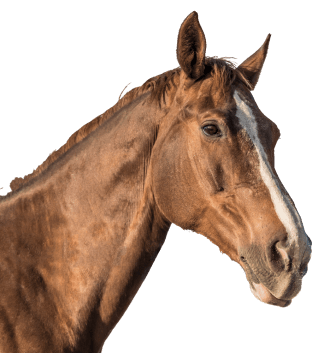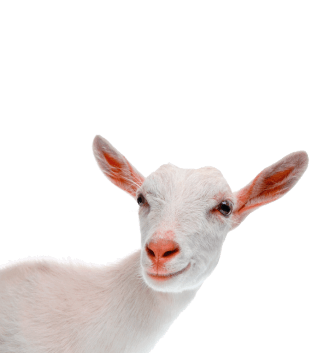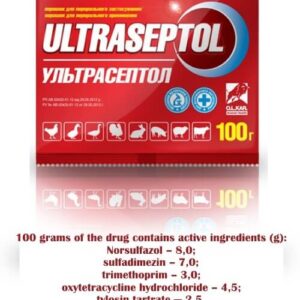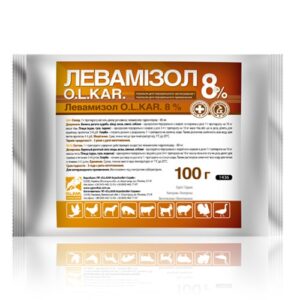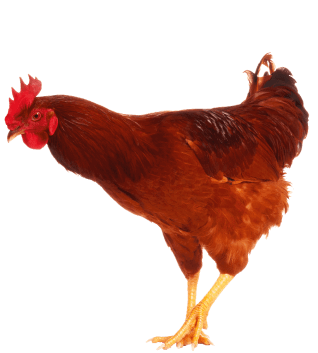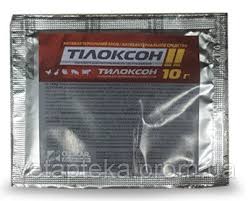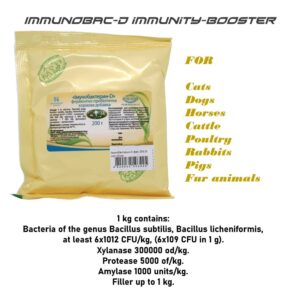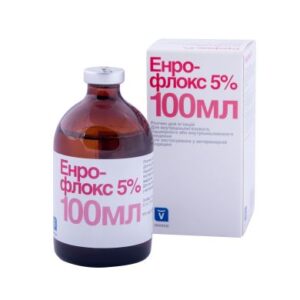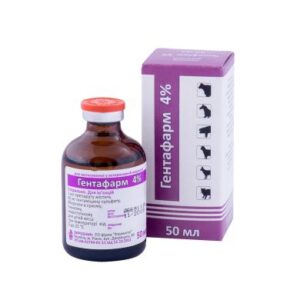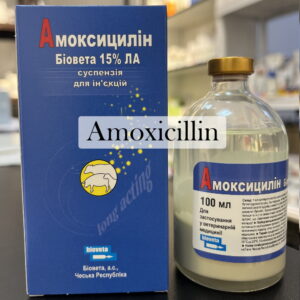Doxycycline 120 mg/ml Injected Antibiotic, 100 ml
Description
Viscous solution from yellow to brown.
Compound
1 ml of the drug contains the active ingredient doxycycline hydrochloride – 120 mg.
Excipients: propylene glycol, magnesium chloride, lidocaine, water for injection.
Pharmacological properties
Doxycycline, which is part of the drug, belongs to the semi-synthetic antibiotics of the tetracycline group with a wide spectrum of action, is active against gram-positive and gram-negative microorganisms, incl. Escherichia coli., Yersinia enterocolitica, Bordettela pertussis, Shigella spp., Haemophilus spp., Pasteurella spp., Salmonella spp., Staphylococcus spp., Streptococcus spp., Klebsiella pneumoniae, Leptospira spp., Clostridium spp. , Erysipelothrix rhusiopathiae, Fusobacterium necroforum, Actinobacillus spp., Rickettsiae spp., Chlamidia spp, and Mycoplasma spp.
The mechanism of the bacteriostatic action of doxycycline is associated with the inhibition of enzymes that catalyze the binding of aminoacetyl RNA to ribosomal acceptors, which leads to blocking the interaction of aminoacyltransport RNA with messenger RNA and disruption of microbial cell protein synthesis.
After parenteral administration of the drug, doxycycline is well and rapidly absorbed from the injection site, reaching therapeutic concentrations in 0.5-1 hour; easily penetrates into most organs and tissues of the animal, metabolized in the liver with the formation of inactive metabolites. It is excreted from the body mainly with bile and partly with urine.
According to the degree of impact on the body, doxycil belongs to moderately hazardous substances (hazard class 3 according to GOST 12.1.007-76), in recommended doses it is well tolerated by animals, does not have embryotoxic, teratogenic and hepatotoxic properties.
Application
Doxycycline is used to treat cattle, sheep, goats, pigs and dogs with infections caused by microorganisms sensitive to doxycycline, including colibacillosis, salmonellosis, staphylococcosis, pneumonia, hemophilia, swine enzootic pneumonia, swine erysipelas, pasteurellosis, foot rot, ehrlichiosis in dogs, keratoconjunctivitis, wound infection, arthritis, umbilical sepsis, abscesses, chlamydia and other diseases of bacterial and mycoplasmal etiology.
Dosage
Doxycycline is administered to animals once in doses:
- cattle, sheep and goats – 1.0 ml per 10 kg of animal weight (which corresponds to 12 mg of doxycycline per 1 kg of animal body weight);
- pigs – 0.5 ml per 10 kg of animal weight (which corresponds to 6 mg of doxycycline per 1 kg of animal body weight);
- dogs – 0.25 ml per 10 kg of animal weight (which corresponds to 3 mg of doxycycline per 1 kg of animal body weight).
If necessary, the drug is used again 48 hours after the first injection.
Due to the possible pain reaction when the drug is administered in a volume exceeding 2.5 ml for piglets and lambs, 5 ml for adult pigs, sheep and calves, and 10 ml for cattle, injections should be carried out in several places.
Treatment of dogs with chlamydial infections should last at least 7 days.
The drug should be used with caution in calves under the age of 12 months. and piglets up to 6 months. in connection with the possibility of side effects – pain reaction during injection and swelling at the injection site.
*Kilograms to Pounds conversion table
| Kilograms (kg) | Pounds (lb) | Pounds+Ounces (lb+oz) |
| 0.1 kg | 0.220 lb | 0 lb 3.527 oz |
| 1 kg | 2.205 lb | 2 lb 3.274 oz |
| 5 kg | 11.023 lb | 11 lb 0.370 oz |
| 10 kg | 22.046 lb | 22 lb 0.740 oz |
Contraindications
The drug should not be used in animals during pregnancy and lactation. It is forbidden to use the drug simultaneously with antibiotics of the penicillin and cephalosporin groups, as well as calcium preparations due to a possible decrease in its activity.
Side effect
When using Doxycil according to the package insert, side effects are usually not observed, with the exception of increased individual sensitivity of the animal to doxycycline, in these cases, intravenous administration of calcium preparations (calcium gluconate, calcium chloride), antihistamines is indicated.
Overdose
In case of an overdose of the drug Doxicil, the following symptoms may occur: diarrhea, vomiting, refusal to feed, impaired coordination of movement. In this case, you should stop using the drug and conduct symptomatic therapy.
Cautions
Slaughter of animals for meat is allowed no earlier than 21 days after the last use of Doxicil. The meat of animals forcedly slaughtered before the expiration of the specified period may be used as feed for fur-bearing animals.
Storage
The medicinal product is stored in a closed manufacturer’s packaging, separately from food and feed, in a dry, dark place inaccessible to children at a temperature of 5ºС to 25ºС.




